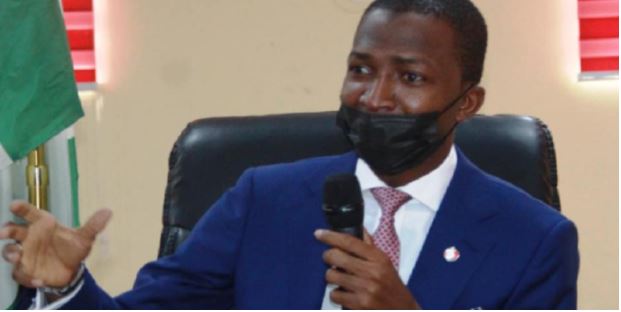The West African financial intelligence agency, Inter-Governmental Action Group against Money Laundering, has said 300 casinos operating in Nigeria may be involved in money laundering.
This is as Nigeria is battling to stem terrorism financing amid the escalating attacks by terrorists from the Islamic State West Africa Province.
The body, established by the Economic Community of West African States, noted that money laundering risks to the casinos which are operating mainly in Lagos and Abuja were high.
It added that the gambling spots were mostly owned by foreigners from South Africa, China, Lebanon, the United States, Germany, and the United Kingdom.
GIABA stated these in a report titled, “Money laundering risks of casinos and the gambling sector in West Africa,” which focuses on the casino and gaming sectors in six GIABA member states of Nigeria, Ghana, Senegal, Cabo Verde, Côte d’Ivoire, and Benin.
The research was carried out in the context of the ‘Organised Crime: West African Response to Money Laundering and the Financing of Terrorism Project’ funded by the European Union.
It said indicators of ML via online casinos and games include large placements made into an online account associated with the casino, while only a few games were played with minimal losses or wins before being cashed out; deposits or payouts into and out of online casino accounts that are only slightly below the threshold limit for reporting; using mobile payments include buy-ins at a cash window using e-wallets or mobile payments on multiple smartphones; buy-ins using e-wallets or mobile payment methods that have only recently been set up and do not yet have recorded transaction histories, among others.
GIABA observed that Nigeria conducted its first and only National Risk Assessment of money laundering and terrorism financing six years ago in 2016 and was expected to carry out another NRA last year, but the ECOWAS agency could not be ascertained if this had been done.
The National Risk Assessment of money laundering and terrorism financing is one of the key requirements of the Financial Action Task Force, an intergovernmental organisation founded in 1989 on the initiative of the G7 to develop policies to combat money laundering.
FATF Recommendations enable countries to identify, assess and understand the money laundering and terrorist financing risks that they are exposed to.
The ECOWAS specialised institution responsible for facilitating the adoption and implementation of Anti-Money Laundering and Counter-Financing Terrorism in West Africa had in its 2021 evaluation report released last year said that ISWAP moved about N18 billion ($36 million) generated from taxing communities in the Lake Chad region, through Nigeria’s financial system annually.
Our correspondent reported that the evaluation also indicted the regime of the President, Major General Muhammadu Buhari (retd.) for failing to confiscate the assets of terrorists as stipulated in the global anti-money laundering and counter-terrorist financing standards.
The ECOWAS agency in its latest report released in March 2022, said, “There are 300 licensed casinos in operation in Nigeria today. Money Laundering risks to the casino sector are considered relatively high in Lagos and Abuja. There are approximately 150 licensed casinos in Lagos alone (50 per cent of all licensed casinos in the country).
Though casinos were required to file Suspicious Transaction Reports regularly, the Task Force noted that this was not the case.
At the national level, the Central Bank issued guidance requiring designated non-financial businesses and professions such as real estate agents, dealers in precious metals and stones, lawyers, car dealers, accountants, and others.
GIABA also expressed concern that only eight Nigerian Financial Intelligence Unit staff members, out of over 200, were dedicated to casinos.
When contacted for comments, an NFIU spokesman, Sani Tukur, promised to respond. “Will revert later, God-willing,” he said in a text message. However, he had yet to do so as of the time of filing this report.
The spokesman to the Attorney-General of the Federation, Umar Gwandu, asked our correspondent to send his query through a text message but had yet to respond as of press time.
Also, the umbrella body of casino operators, the Association of Nigerian Bookmakers could not be reached for comment on Saturday as the three numbers listed on its website were switched off.
Nigeria may face FATF sanctions
Meanwhile, Nigeria may face sanctions from the Financial Action Task Force for non-compliance with certain money laundering and terrorism financing standards.
A senior official confided in our correspondent that the nation has little time to observe the international recommendations stipulated by the agency.
Sunday PUNCH gathered on Saturday that the fear of sanctions may have informed the inauguration of committees on the implementation of the Anti-Money Laundering and Counter-Financing Terrorism recommendations by the Ministry of Interior and the Nigeria Police last Friday.
Similarly, the Inspector General of Police, Usman Baba, inaugurated a committee to review documents from the NFIU and provide necessary information for the effective functioning of the FATF in the country.
The 21-member committee, headed by DCP Adegbite Olaolu, was directed to submit its report within one week.
A security and risk assessment consultant, Kabir Adamu said there were gaps in the Nigerian money laundering and terrorism financing laws, but added that the objective of the Terrorism Prevention Act which was amended a few months ago was to align the nation’s terrorism law with international standards.
Adamu said, “You have these casinos, unfortunately, they are not properly regulated and neither does the government know what is happening in them.”

